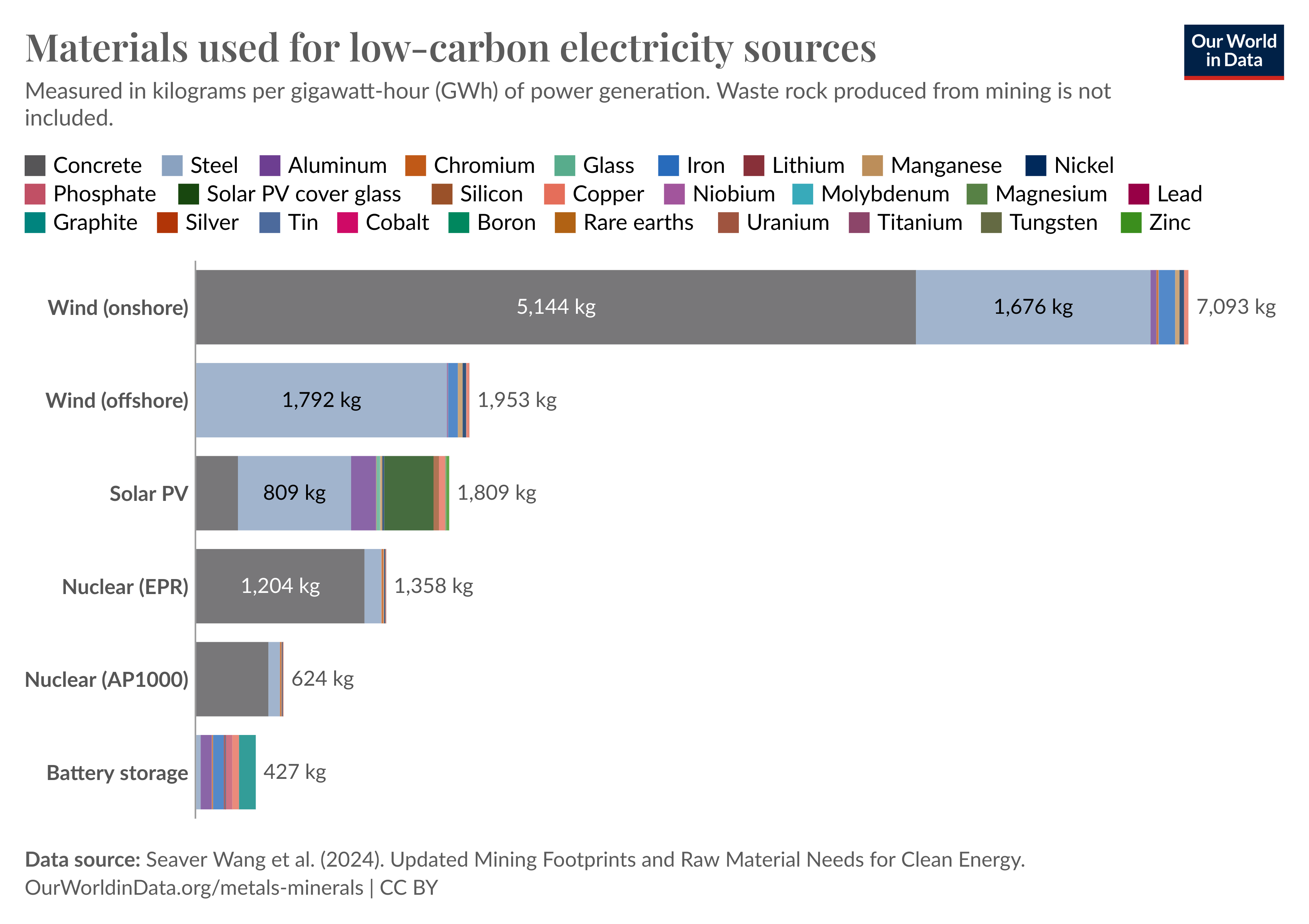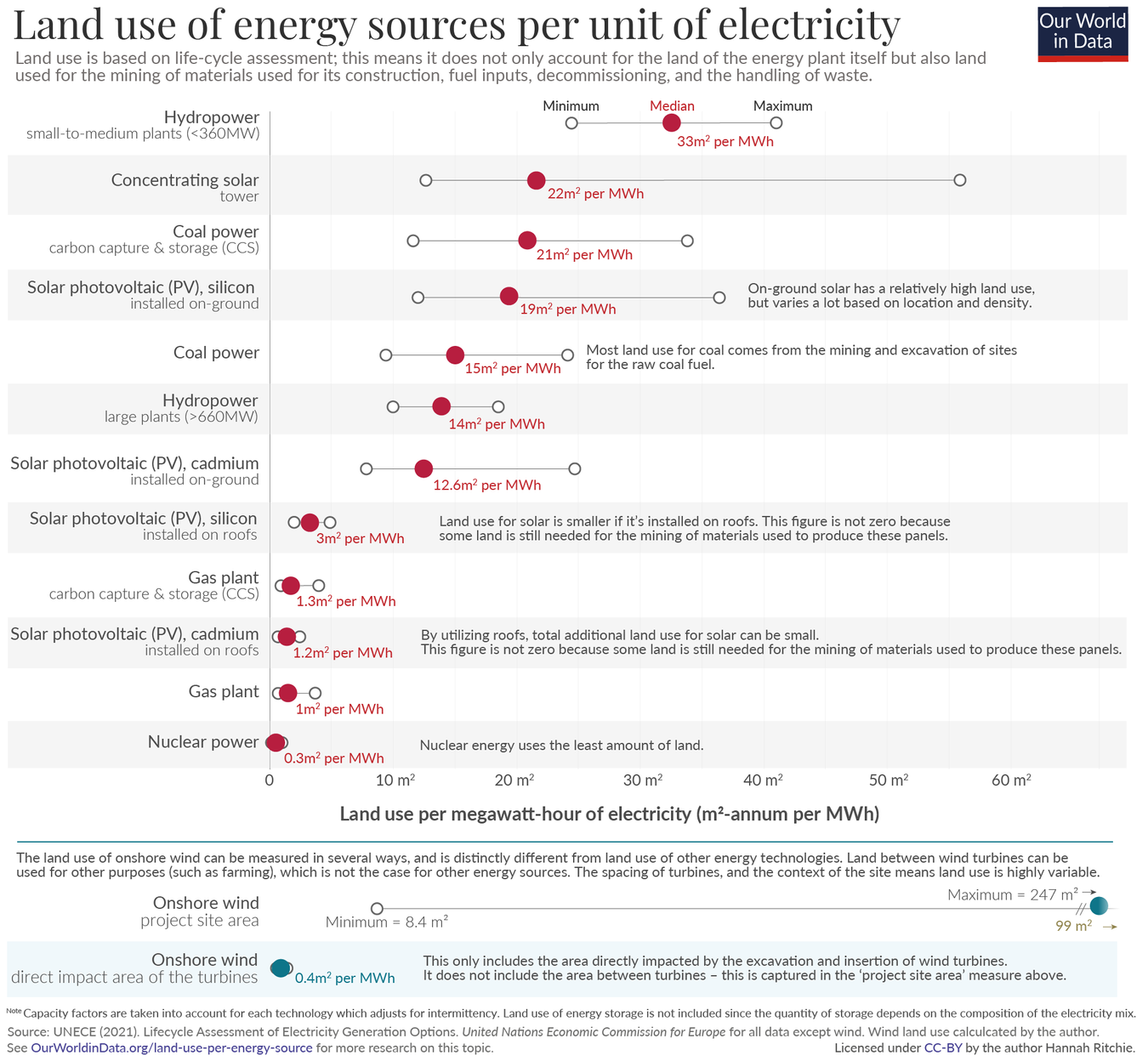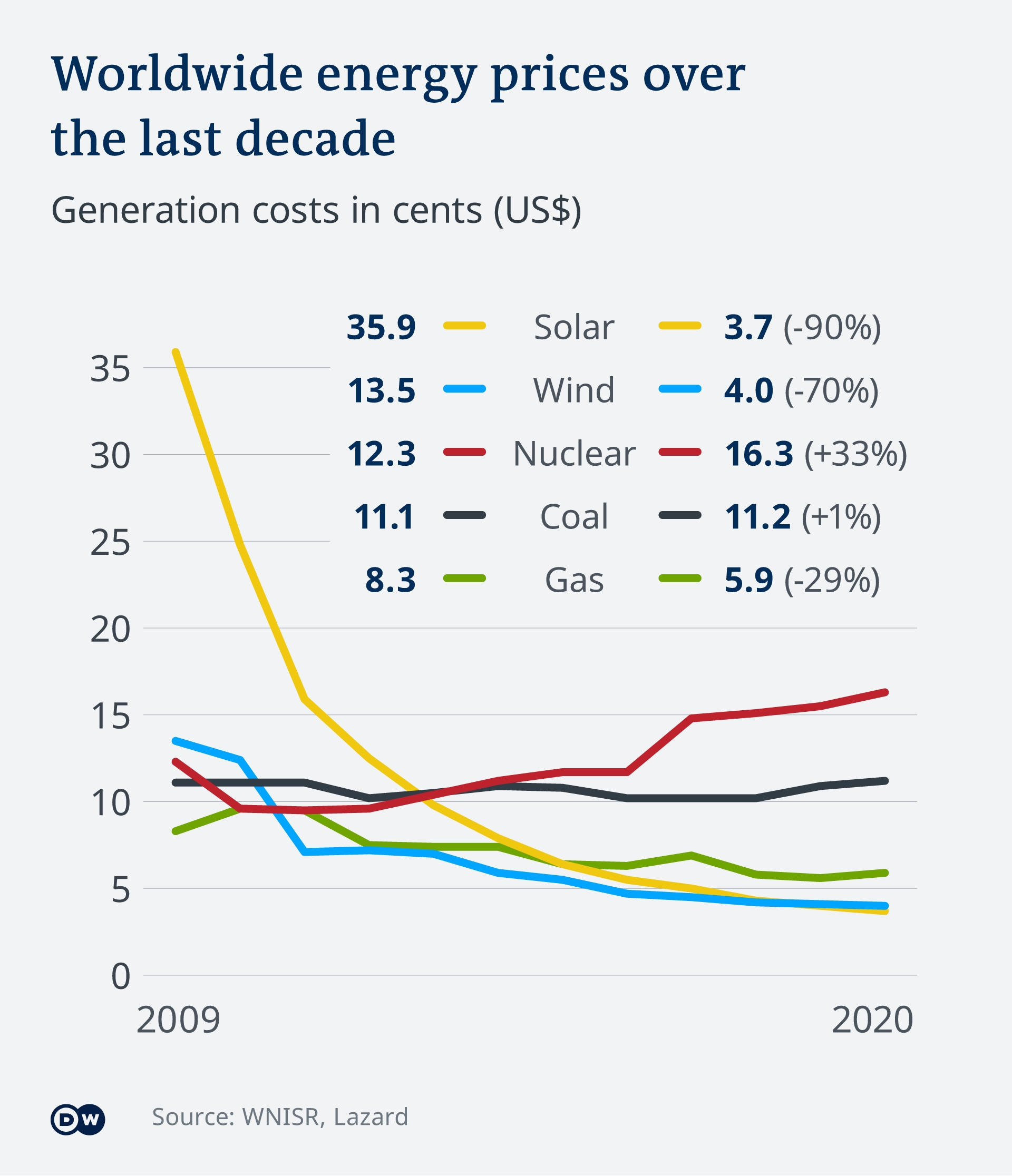Well, you see, the “Anti Magic Rock” Lobby has immense amount of power because of the money of the still lucrative “burning stuff and pollute everything” business.
It’s the “Burning other magic rocks” party.
That, and the green parties (at least in EU).
The “green” parties 💵💵
Yeah, oil oiled the “green” anti-nuclear protests.
You can tell that’s how it was because the cops didn’t beat them as much (or in some big cases at all) as they do even the most insignificant anti-oil protesters.
I feel like people are interpreting your comment with an American context. As a fellow European I agree, NGOs like Greenpeace are also to blame, and I don’t think those are financed by fossil fuel lobbies.
I hadn’t made that connection. Thank you
Nuclear isn’t in competition with fossil fuels, it’s in competition with renewables. Renewables are better than nuclear by pretty much every conceivable metric. So fuck nuclear power, it’s a waste of money and time.
Fact: that is a fake statement.
Nuclear is not renewables competition.
Nuclear provides a base line energy production.
Both renewables and fossils produce a variable production line.
So within a rational production scheme the choice is nuclear+renewables or fossils+renewables. As renewables by themselves cannot work. Because there is months over the year when it’s not sunny, not rainy and not windy enough, what do we do for those months? We close humanity during those months because some political dogma says so?
Since we are talking hypotheticals, an ideal scenario would be a nearly completely renewables approach where each household is its own self contained energy production center equippef with solar arrays, wind turbines, thermoelectric generators. Various means of production. And have either propane or diesel generator as a backup. You know your average overall watt-hour usage for the household and try to have enough battery capacity to satisfy it for a week or two of bad weather.
Most household electrical wiring is redone for DC transmission and all consumer appliances possible are run straight on DC for optimal efficency. Energy efficent heat pumps for cooling and heating. energy efficent cooking appliances like induction heaters. Electric cars that act as backup battery banks would be awesome.
Industrial zones would be much harder as you need huge solar panel or wind turbine arrays to get the megawatt and gigawatts needed to run a factory. Most factories are decades old running on the most energy ineffient assembly lines you can think of. A energy mandate that calculated and taxed total energy efficency compared to national average for factory size and the would be a start.
Humanity simply does not “stop” because we go through an energy crisis. We did fine enough before the industrial revoltion and renewables + energy efficent consumer devices have improved a bunch. The economy would tank and what renewable energy made would be a premium commodity and the system would adapt to use it best as possible. But things would go on.
Are you sure renewables don’t require more extracted resources and more land usage per quantity of energy produced?
yes
You may be incorrect


Burning down your house doesn’t poison people thousands of years later, so it’s not a perfect analogy.
Plus we have magic mirrors and magic fans that do the same thing as the magic rocks just way cheaper.
We’ve upgraded from burning our houses down to burning our atmosphere down which will absolutely poison humans for centuries to come. And since we now burn larger fires with black rocks, those release far more magic rock dust that poisons people than the magic rock water heaters do. Not to mention that fire has both killed more of us cave dwellers than magic rocks ever have (including the flying weaponry runes made from them) and have caused more ecological disasters, so fire is much worse.
Then we talk magic mirrors, they have evil rocks in them that get in our rivers and we don’t contain well. That aside, we show tradition to our ancestors by making much of them with slavery.
And the magic fans? The design is very human. They’d be a gift from the gods if only the spirit of the wind were always with us.
Summary: Magic rock still good, black rocks and black water make bad fire and hairless monkey make sick more.
Then we talk magic mirrors, they have evil rocks in them that get in our rivers and we don’t contain well. That aside, we show tradition to our ancestors by making much of them with slavery.
Sure, because mining uranium is total helaty and no problem at all.
https://genesenvironment.biomedcentral.com/articles/10.1186/s41021-015-0019-3
One must be very careful when digging for magic hot rocks or else you expose the evil spirit vapors. Our ancestors knew that where there is magic, some evil lurks. As they did then, we do now when we accept a better evil in return for the magic we believe may do more good than before.
I love the wording in here
This is exactly, factually right, and eloquently put using the same meme terminology people here understand.
deleted by creator
We had magic mirrors and magic fans for centuries tho.
Yet we decided to release way more poison and even way more radiation by mining and burning fossil fuels. We just poison larger areas than any nuclear disasters. And with fossil fuels people actually get cancer, and with toxic byproducts, mutations and birth defects.
People in polluted areas die sooner. Except around nuclear disasters sights - the air gets cleaner once all the people are thrown out.
We had magic mirrors and magic fans for centuries tho.
We’ve had solar and wind electricity generation for centuries?
Eccentricity generators were invented before mass oil or coal use (1830s by Faraday).
We’ve had windmills, hydro, and even animal/human powered devices that could result in turning cranks for the generator to produce electricity - all for centuries at even that point. I would have to look up about when we first used solar to boil water, but I’m guessing there about.
Biomass and windmills perhaps
You say thousands of years, but it hasn’t been even 70 years since Chernobyl and the surrounding area is a thriving forest with tons of animals, unbothered by humans.
 .
Don’t feed the troll 💩
.
Don’t feed the troll 💩As long as you don’t care when the electricity is produced
Storage is a solvable problem. Whereas we don’t have the resources to power the world with nuclear plants.
Storage is a solvable problem
I’m not convinced it is. Storage technologies exist for sure, but the general public seems to grossly underestimate the scale of storage required to match grid demand and renewables only production.
I think you underestimate how much storage power is currently being build and how many different technologies are available. In Germany alone there currently are 61 projects planed and in the approval phase boasting a combined 180 Gigawatts of potential power until 2030. Those of them that are meant to be build at old nuclear power plants (the grid connection is already available there) are expected to deliver 25% of the necessary storage capacity. In addition all electric vehicles that are assumed to be on the road until 2030 add another potential 100GW of power.
Of course these numbers are theoretical as not every EV will be connected to a bidirectional charger and surely some projects will fail or delay, however given the massive development in this sector and new, innovative tech (not just batteries but f.e. a concrete ball placed 800m below sea level, expected to store energy extremely well at 5.8ct / kilowatt) there’s very much reason for optimism here.
It’s also a funny sidenote that France, a country with a strong nuclear strategy, frequently buys power from Germany because it’s so much cheaper.
Another important note about France: They are the second country alongside Germany heavily pushing for an upscaled green hydrogen market in the EU. Because -just like renewables- nuclear production doesn’t match the demand pattern at all. Thus it’s completely uneconomical without long-term storage.
The fact that we seem to constantly discuss nuclear vs. renewables is proof that it’s mostly lobbying bullshit. Because in reality they don’t compete. It’s either renewables+short-term storage+long-term-term storage or renewables+nuclear+long-term storage. Those are the only two viable models.
upscaled green hydrogen market
That’s been the talk in town for 40 years now. Green hydrogen has never gotten beyond proof-of-concept.
The fact that we seem to constantly discuss nuclear vs. renewables is proof that it’s mostly lobbying bullshit.
Sadly, it’s because the political green parties available to me are anti-nuclear.
It’s either renewables+short-term storage+long-term-term storage or renewables+nuclear+long-term storage.
Why is nuclear+short term storage not an option, according to you?
Why is nuclear+short term storage not an option
Because cold winter days exist. Yes you can only build nuclear capacities for the average day and then short-term storage to match the demand pattern. But you would need to do so for the day(s) of the year with the highest energy demand, some cold winter work day. What do you do with those capacities the remaining year as throttling nuclear down is not really saving much costs (most lie in construction and deconstruction)?
deleted by creator
Due to the recent nuclear hype uranium price will rise and keep in mind that the resource will not exceed a century.
It’s not just power that’s needed (MW), also stored energy (MWh).
Germany consumes on average 1.4TWh of electricity a day (1). Imagine bridging even a short dunkelflaute of 2 days.
Worldwide lithium ion battery production is 4TWh a year (2).
It’s also a funny sidenote that France, a country with a strong nuclear strategy, frequently buys power from Germany because it’s so much cheaper.
Isn’t that normal? The problems with renewables isn’t that they generate cheap power, when they are generating. Today windmills even need to be equipped with remote shutdown, to prevent overproduction.
The problems arise when they aren’t generating.
Your estimation goes way off because you still believe lithium ion to be the only viable solution. By now Sodium-Ion batteries are already installed even in EVs and can be produced without any critical resource like lithium.
And then of course there are all the other storage solution. Like I said, there even are storage solutions like concrete balls. Successfully tested in 2016, here an article from 2013.
By now it wouldn’t be wise to stifle this enormous emerging market of various technologies by using expensive, problematic technology (not just because the biggest producer of fuel rods is Russia).
I don’t think lithium ion is the only storage technology. I was using it for scale.
The most cost effective storage is pumped storage. But even that wouldn’t reach the scale necessary.
6 MWh pumped storage proof-of-concept won’t l, either.
The watthours is what gas is for. Germany’s pipeline network alone, that’s not including actual gas storage sites, can store three months of total energy usage.
…or at least that’s the original plan, devised some 20 years ago, Fraunhofer worked it all out back then. It might be the case that banks of sodium batteries or whatnot are cheaper, but yeah lithium is probably not going to be it. Lithium’s strength is energy density, both per volume and by weight, and neither is of concern for grid storage.
Imagine bridging even a short dunkelflaute of 2 days.
That’s physically impossible for a place the size of Germany, much less Europe.
is what gas is for
Wouldn’t it be better to go fossil free. Given, you know, climate change. And the fact that the gas needs to be shipped all the way from the US.
That’s physically impossible for a place the size of Germany, much less Europe.
Unless we use a different technology, that is not renewables + storage?
Another problem arises when you’re generation 63.688 after today and still have to keep maintaining deadly waste from nations that don’t exist anymore, because they produced “cheap” and “clean” energy for a couple of decades.
Come on, Jesus died like 2000 years ago, this stuff will haunt us for centuries. Arguing in favor of something this unpredictable is just selfish, stupid and shortsighted.
Again: This is just the beginning! We’re like
five years intoat the beginning of an energy revolution and you are drumming against it because you’re “not convinced”, rooting for stuff we already discarded because it’s uncontrollable and will poison our planet for centuries. Get out of the way, boomer!Germany has over 400 MW of solar-plus-storage projects under development, with notable installations like a 100 MW/200 MWh battery system in Bavaria. This is way more than even the green minister of economic affairs set as a goal for 2045. California leads globally with 6,600 MW of battery storage already operational and an additional 1,900 MW expected by year-end, totaling 8,500 MW. By 2045, California aims to expand its capacity to 52,000 MW. Australia is also scaling rapidly, with around 9 GW of utility-scale battery projects underway or completed. Soon EV batteries get to feed energy back into the grid, we’re becoming one huge decentralized batterie mosaic. It’s gonna be beautiful!
We’re like five years into an energy revolution
Exactly, after working on it for over 30.
It seems like theyre not even planning on going fossil free.
That quote, again, not mentioning stored energy. How do they not understand that storage needs to be specified in both power and energy?
The fossil industry, which earns 1 billion dollars a day since the 1970s, won’t go down without a fight. They are very powerful, able to start wars and overthrow governments. These fossil destroyers know they are dying, but they will fight back to make money as long as possible. The best we can do is drain their business model by going renewable, and fast. Nuclear is not an option anymore, they know that as well, it’s already way too expensive. But they use it anyway to buy some time. Making more money while we are debating instead of building renewables and batteries like our lives depend on it.
I always imagine Henry Ford after building his first cars. People would laugh at him: “And how do we fuel these?! You want to pave every road and build a web of gas stations all over or country? You are insane!”it’s already way too expensive.
If you don’t account for the storage problem, renewables look like a cheap solution, indeed. And you end up with renewables + huge reliance on fossil fuel.
This is an ideal scenario for the fossil industry.
Ok but maybe a counterpoint is we are overestimating the ability of the atmosphere and ocean to absorb CO2 and maintain a habitable planet. I’d rather store isotopes in the earth (where they came from anyway) than carbon in the air.
The second half if most important. It doesn’t produce enough electricity. Renewables are getting cheaper and cheaper and are taking up the mantle to take over majority of power production in some nations. But it is harder to monetize and can be democratized and made pretty easily. It’s like weed. It can be taken away from bigger producers and therefore there is significant push back/lobbying against it.
Storage is a solvable problem.
Not in this economy. We need change in consumption too. Make loads opportunistic. Have extra energy - heat more water. Or heat homes. There was video on Technology Connected about it.
Don’t feed the troll! We’re making progress fast. ☀️
Nuclear: As long as you don’t care about the magic rocks once the magic has decayed to a level where they’re not boiling water anymore
90% of magic rocks that no longer boil wsater is magic rocks that can boil water.
If you’re talking breeder reactors, do we have any in the US?
If you’re talking breeder reactors
I was talking about reusing uranium from “spent” fuel, not about using plutonium. Found source that says “spent” fuel is 95-98% mix of uranium isotopes that were there. Sadly, source doesn’t say how much of each isotope, I expect very low amount of U-235. Yes, you can also use plutonium in MOX fuel, but only Russia~~, France~~ and China do that, as far as I know.
do we have any in the US?
Dunno. Do you? If you don’t, you can buy them from mentioned above countries.
EDIT: France no longer has working breeder reactor? How did it happen?
Funny how nuclear power plants are taboo, but building thousands of nuclear warheads all over the globe is no issue.
Funny how building nuclear power plants that can only (if you have dipshits running them) kill a nearby city is taboo, but climate change that will kill everyone is acceptable to the moralists.
Funny how solar, wind, and batteries are way cheaper and faster to build yet people are still talking about nuclear.
Stopping nuclear from being built is the problem.
We would have had a lot more clean energy than we do by now if we let the nuclear power plants that “would take too long to build!” be built back then, because they’d be up and running by now.
More letting perfect be the enemy of good.
Nuclear may have been good 10 years ago, but it isn’t really good anymore. This is like saying “if I had bought a PS2 in 2002 then I would have had fun playing Final Fantasy XI Online. Therefore, I should buy a PS2 and FFXI Online so I can have fun in 2024”. That ship has sailed
You can still play FFXI in 2024 officially on PC. Just don’t need the PS2.
and we can have 100% clean, renewable energy in 2024, we just don’t need the nuclear reactor
Nuclear actually releases less CO2 than renewables, because renewables aren’t nearly as clean as you think they are. Those solar panels and wind turbines have to be made somehow. The things needed to make solar panels and batteries aren’t exactly great for the planet to mine and manufacture.
This concept of 100% clean energy is a myth, there are just more and less polluting sources. Nuclear being the least polluting, with fossil fuels being the worst, and renewables in the middle.
If only people weren’t fearmongering about nuclear 50 years ago we’d have clean energy today.
“The best time to plant a tree was 20 years ago, second best is now”
That saying works for trees. We didn’t make trees obsolete with better technology.
Reliable clean energy isn’t a solved issue today either. Until we have grid-level storage we need something that can provide a reliable base and had enough mass/momentum to handle grid fluctuations.
Solar and wind are cheaper yes. Batteries, no. If batteries were that cheap and easy to place we’d have solved energy a long time ago. Currently batteries don’t hold a candle to live production, the closest you can get is hydro storage, which not everyone has, and can’t realistically be built everywhere.
Look at the stats. The second largest battery storage in the US (and the world) is located near the Moss Landing Power Plant. It provides a capacity of 3000 MWh with 6000 MWh planned (Which would make it the largest). That sounds like a lot, but it’s located next to San Jose and San Fransisco, so lets pick just one of those counties to compare. The average energy usage in the county of San Clara, which contains San Jose (You might need to VPN from the US to see the source) is 17101 GWh per year, which is about 46.8 GWh per day, or 46800 MWh. So you’d need 8 more of those at 6000 MWh to even be able to store a day’s worth of electricity from that county alone, which has a population of about 2 million people. And that’s not even talking about all the realities that come with electricity like peak loads.
For reference, the largest hydro plant has a storage capacity of 40 GWh, 6.6x more (at 6000 MWh above).
Relative to how much space wind and solar use, nuclear is the clear winner. If a country doesn’t have massive amounts of empty area nuclear is unmissable. People also really hate seeing solar and wind farm. That’s not something I personally mind too much, but even in the best of countries people oppose renewables simply because it ruins their surroundings to them. Creating the infrastructure for such distributed energy networks to sustain large solar and wind farms is also quite hard and requires personnel that the entire world has shortages of, while a nuclear reactor is centralized and much easier to set up since it’s similar to current power plants. But a company that can build a nuclear plant isn’t going to be able to build a solar farm, or a wind farm, and in a similar way if every company that can make solar farms or wind farms is busy, their price will go up too. By balancing the load between nuclear, solar, and wind, we ensure the transition can happen as fast and affordable as possible.
There’s also the fact that it always works and can be scaled up or down on demand, and as such is the least polluting source (on the same level as renewables) that can reliably replace coal, natural gas, biomass, and any other always available source. You don’t want to fall back on those when the sun doesn’t shine or the wind doesn’t blow. If batteries were available to store that energy it’d be a different story. But unless you have large natural batteries like hydro plants with storage basins that you can pump water up to with excess electricity, it’s not sustainable. I’d wish it was, but it’s not. As it stands now, the world needs both renewables and nuclear to go fully neutral. Until something even better like nuclear fusion becomes viable.
You know why people who live near wind power hate wind power?
It’s because their neighbour got paid to host a turbine, and they did not. It is envy.
I’m sure such cases exist, but where I’m from people don’t really get paid to host turbines, maybe companies at times. They dislike them because it affects the view in the area, and especially if you live very close to them the blades can cause noticeable flickering shadows. That latter point has a lot more weight to it in my eyes, but people do really care about the former as well, and it’s kind of hard to push on people when they live there and not you.
I’m taking from the Australian context where someone always owns the land and it’s cheaper to buy rights to place and service a turbine then to buy land
I suppose you live somewhere the land can be leased from government
Ok let’s compare real data then. Vogtle 3&4 are the latest nuclear plants to be completed in the US. They cost over 30 billion dollars for a capacity of 2.106GW. That’s >14.2 dollars/watt. Let’s be generous and assume nuclear has a 100% capacity factor (it doesn’t).
I can’t find real numbers for Moss Landing specifically, but NREL has data on BESS costs up to 10 hr storage at $4.2/watt. Let’s ignore that no grid in the country actually needs 10hr storage yet.
Utility scale solar has well known costs of ~1 dollar/watt. Let’s assume a capacity factor of 25%, so for equivalent total energy generation we are looking at $4.
$4 for solar, $4.2 for BESS, and since you’ll complain about not having 24hr baseline let’s add another equivalent 10hr storage system at $4.2. that’s a total of $12.4, compared to Vogtle’s $14.2.
Add in that the solar plus BESS would be built in 1-2 years, while Vogtle took well over a decade.
Also consider that BESS systems have additional value in providing peaking ability and frequency regulation, among other benefits.
Also consider that PV and batteries have always gotten cheaper over time, while nuclear has always gotten more expensive.
2.160 GW is it’s rated capacity. I’m not sure how you got from there to 14.2 dollars per watt, but it completely ignores the lifetime of the power plant.
Vogtle 3&4 are really a bad example because unit 4 only entered commercial activity this year. But fine, we can look at what it produces just recently.. About 3335000 MWh per month, or about 107 GWh per day. We can then subtract the baseline from Reactor 1 & 2 from before Reactor 3 was opened, removing about 1700000 MWh per month. Which gives us about 53 GWh per day. The lifetime of them is expected to be around 60 to 80 year, but lets take 60. That’s about 1177200 GWh over it’s lifetime, divided by the 36 billion that it cost to built… Gives you about 0.03 dollars per kWh. Which is pretty much as good as renewables get as well. But of course, this ignores maintenance, but that’s hard to calculate for solar panels as well. As such it will be somewhat larger than 0.03, I will admit.
Solar panels on the other hand, often have a lifetime of 30 years, so even though it costs less per watt, MW, or GW, it also produces less over time. For solar, and wind, that’s about the same.. So this doesn’t really say much.
But that wasn’t even the point of my message. As I said, I agree that Nuclear is slightly more expensive than renewables. But there are other costs associated with renewables that aren’t expressed well in monetary value for their units alone. Infrastructure, space, approval, experts to maintain it.
Let’s ignore that no grid in the country actually needs 10hr storage yet.
Because they cannot. They can’t do it because there’s not enough capacity. If the sun is cloudy for a day, and the wind doesn’t run. Who’s going to power the grid for a day? That’s right. Mostly coal and gas. That’s the point. Nuclear is there to ensure we don’t go back to fossils when we want to be carbon neutral, which means no output. If you are carbon neutral only when the weather is perfect for renewables, then you’re not really carbon neutral and still would have to produce a ton of pollution at times.
I’m glad batteries and all are getting cheaper. They are definitely needed, also for nuclear. But you must also be aware of just how damn dirty they are to produce. The minerals required produce them are rare, and expensive. Wind power also kills people that need to maintain it. Things aren’t so black and white.
Also consider that PV and batteries have always gotten cheaper over time, while nuclear has always gotten more expensive.
This is not true, and it should be obvious when you think about it. Since this data fluctuates all the time. Nuclear has been more expensive in the past, before getting cheaper, and now getting more expensive again. Solar and wind have had peaks of being far more expensive than before. These numbers are just a representation of aggregate data, and they often leave out nuance like renewables being favored by regulations and subsidies. They are in part a manifestation of the resistance to nuclear. Unlike renewables, there are many more steps to be made for efficiency in nuclear. Most development has (justifiably) been focused on safety so far, as with solar and wind and batteries we can look away from the slave labor on the other side of the world to produce the rare earth metals needed for it. There is no free lunch in this world.
For what it’s purpose should be, which is to provide a baseline production of electricity when renewables are not as effective. A higher price can be justified. It’s not meant to replace renewables altogether. Because if renewables can’t produce clean energy, their price might as well be infinitely high in that moment, which leaves our only options to be fossil fuels, hydro, batteries, or nuclear. Fossil fuels should be obvious, not everyone has hydro (let alone enough), batteries don’t have the capacity or numbers at the scale required (for the foreseeable future), and nuclear is here right now.
Would battery companies allow the price to go down? They are quite greedy as well.
There is competition in battery production. Pretty much all of society would be better off with better batteries, so price gauging in an industry like that is quite hard. And if it was, it would not go unnoticed.
The problem is simply the technology. There’s advancements like molten salt batteries, but it’s practically in it’s infancy. The moment a technology like that would become a big improvement over the norm, it would pretty much immediately cause a paradigm shift in energy production and every company would want a piece of the pie. So you’ll know it when you see it. But it might also just start off very underwhelmingly like nuclear fusion and very gradually improve with the hope it can scale beyond the current best technologies for batteries.
All we can do is wait and hope for breakthrough, I guess. Because cheap and abundant batteries could really help massively with reducing our carbon output.
Funny how whataboutism makes your audience defensive.
Funny how being polite didn’t convince you so now you’re trying to sell that being mean is going to stop you. You were always useless.
Hey, I hear you, life is stressful and there’s a lot going on. It’s okay to be upset, I hope whatever you’re going through gets easier.
deleted by creator
Is there a particular reason you think everyone, here specifically, believes those things?
Edit: I absolutely share your passion about climate change, as a preface. Calling someone, who agrees with you or not, “useless” makes them dismiss your opinion. It just means we can’t engage in any meaningful discussion and others are less likely to take action.
A nuclear power plant cannot destroy a city.
I guess destroy != Make unlivable
People don’t put reactors next to cities for a reason. Meaning this scenario wouldn’t happen. Nuclear is also one of the safest energy sources overall in terms of deaths caused. It’s safer than some renewables even, and that’s not factoring in advances in the technology that have happened over the decades making it safer. This kind of misinformation is dangerous. It’s also not a good reason not to do nuclear. The reason why renewables are used more (and probably have a somewhat larger role to play in general) is because they a cheaper and quicker to manufacture. Nuclear energy’s primary problem isn’t safety but rather cost. It’s biggest strength is reliability and availability. You can build a nuclear plant basically anywhere where there is water.
I know nuclear is super safe but we have actual examples of accidents happening and making cities unlivable, you can’t deny that.
Which cities? I haven’t heard of any cities being made unlivable, only towns and villages.
🙄 I’m sorry, I was unaware of the population requirement
Depends on where you live, Germany that gets the beating for phasing out nuclear, is so densely populated that these remote areas hardly exist!

That’s actually an interesting point. Maybe we shouldn’t put nuclear reactors in Germany.
And that cannot happen. It’s a fear people have because they equate a nuclear power plant with a nuclear bomb. That is as wrong as considering the earth flat.
Chernobyl
But that was a really old tech, the plants built after 1990s shouldn’t allow this scale of pollution even if all the stops are pulled and everything breaks in the worst way possible
Chernobyl yes, let’s talk about it : after the catastrophy, 2 reactors were used until very recently (like until 10 or 20 years ago).
After the catastrophy, Chernobyl was made into an exclusion zone where people wouldn’t be allowed to live. But people came back 10 years after and it’s a small village now.
BTW even Hiroshima and Nagazaki that were annihilated with atomic bombs, that is weapons meant to destroy whole cities, were quickly inhabited again.
So much for the permanent destruction and millions of years of contamination. CO2 is a far more deadly compound for mankind than any radioactive material. Anti-nuke militants are merely ignorant fanatics.
Fukushima?
Fukushima, in 2024,is a city of 272569 inhabitants. If that’s unlivable, I’m fine with it. Hiroshima, Nagazaki and Chernobyl are all inhabited too.
Saying that nuclear stuff makes places unlivable is plain wrong, it’s anti-science. It’s comics level of bullshit science. Travel in time is a more serious theory than nuclear stuff destroying the planet.
I’m in Missouri so apparently I’m surrounded by silos
How many fingers do you have?
It’s because there’s no opposing corporate interest to building nuclear weapons. The way the world works is: profitable shit happens, no matter what the hippies think about it. See: every other environmental issue.
You’re right to reject the logic behind that because it’s nonsense. Its not making sense to them because they still presume some kind of good faith when it come to these sorts of things.
The reason we haven’t built more nuclear power stations is because oil, gas and coal companies will make less money, if we build more nuclear power stations.
They have the means, the motive and they have a well recorded history of being that cartoonishly villainous. Nothing else makes sense.
Three Mile Island and Chernobyl really did change things. Prior to those incidents there were plans to build over 50 more nuclear plants in place which got canceled as a result. Currently oil and gas industries will do all they can to keep nuclear from making a come back, but for a long time they didn’t have to do shit thanks to those catastrophes.
They didn’t have to but they did anyway.
Don’t forget Fukushima bring an excellent reminder
It’s crazy that Mr. Burns from the Simpsons was in nuclear and not coal or oil. Probably a product of the propaganda at the time.
Anon is dumb. Anon forgets the nuclear waste. Anon also forgets that the plants for the magical rocks are extremely expensive. So much that energy won by these rocks is more expensive than wind energy and any other renewable.
Anon isn’t dumb, just simple. Nuclear energy can be the best solution for certain situations. While renewables are the better choice in every way, they’re effectiveness isn’t equally distributed. There are places where there just isn’t enough available renewable energy sources year round to supply the people living there. When energy storage and transmission methods are also not up to the task, nuclear becomes the best answer. It shouldn’t be the first answer people look to but it is an answer. An expensive answer but sometimes the best one.
Also nuclear waste doesn’t have to be a problem. If anyone was willing to cover the cost of burning it in a breeder reactor for power or burry it forever. It just is because it’s expensive.
Also nuclear waste doesn’t have to be a problem. If anyone was willing to cover the cost of burning it in a breeder reactor for power or burry it forever. It just is because it’s expensive.
But it is a problem. Finding a place that can contain radioactive waste for millions of years is incredible difficult. If you read up on it, you get disillusioned pretty fast.
When energy storage and transmission methods are also not up to the task, nuclear becomes the best answer.
Obviously, the best answer is to improve energy storage and transmission infrastructure. Why would we waste hundreds of millions on a stupid toy power plant when we could spend 10% of that money on just running decent underground cables.
You do realize that all that is also expensive, and limited? We haven’t invented room temperature superconductors yet, and battery technology is far from perfect. There is only so much lithium and cobalt in the entire world. Yes we can now use things like sodium, but that’s a technology that’s still young and needs more research before it’s full potential is realized. There is also a reason we have overground cables and not underground. Digging up all that earth is hella expensive.
You really don’t understand how expensive underground cables are. You know those big, huge steel transmission towers that you see lined up, hundreds in a row?
Those towers costs hundreds of thousands or millions of dollars each. And the reason they’re used is because that’s way cheaper than underground.
Shit - just the cable is a couple million per mile per cable.
Are you fucking serious? Nuclear power plants cost way fucking more than some cables. You people are fundamentally so unserious. Pull your head out of a reactor for ten seconds and take reality as it exists
Yes. They cost more than some cables. But we aren’t talking about wiring a stereo.
A new nuclear unit (4 billion-ish) costs about as much as 2,000 miles of transmission-grade cable (about 2 million per mile). Considering that there’s about 30 cables on a tower run, you’re looking at around 65 miles’ worth of cable for the cost of a nuclear unit.
And that’s just the cost of the wire. No towers, no conduit, no substations, no land acquisition (aerial easement and underground are very different things), no labor.
Removed by mod
Removed by mod
Because superconductors are even more expensive than breeder reactors.
and breeder reactors are more expensive than faerie magic, I prefer to use technologies that are actually real rather than things I wish were real
I prefer to use technologies that are actually real rather than things I wish were real
Wake up, 80-ies were 40 years ago!
USSR figured it out long time ago: https://en.m.wikipedia.org/wiki/BN-600_reactor
Anon forgets the nuclear waste.
Nuclear waste is pretty tame. Compare gloves that were used once to turn valve on pipe in reactor room to shit from coal in your lungs. Even most active kind of waste everyone thinks of - spent fuel - consists from about 90% of useful material.
EDIT: 95-98% of useful material.
Anon also forgets that the plants for the magical rocks are extremely expensive.
Actually not. Especially cost of energy compared to one of coal.
The costs used for wind/solar energy never included the cost of the required buffer storage, and even the rare few people who include that never factor in frequency stability which to this day is maintained by the giant steam turbines everyone wants to get rid of. It will not be trivial to solve the frequency stability problem; it will likely require massive investment in pumped water storage, flywheel storage, or nuclear energy, and these costs once finally included in the real cost of wind/solar will hurt its value prospect considerably.
As for nuclear waste: the overwhelming majority of nuclear waste generated over the lifetime of a reactor is stored onsite. Only the smallest amount of material is what will actually remain dangerous for a long time, and many countries have already solved this problem. It’s a seriously overstated problem repeated by renewable-purists who usually haven’t even considered how much frequency stability and grid-level storage have and will add to the cost of renewables, meaning they have not given a full accounting of the situation.
And even if we just buried all of it, all nuclear waste ever produced could easily be buried in one square mile.
It’s sad that the coal lobby has convinced so many people that the most reliable clean energy source we’ve ever discovered is somehow bad.
Step 1: Get magic rocks.
Step 2: Now design the rest of the nuclear reactor.
Step 3: ???
Step 4: Profit.
yes
Step 5: Bury cursed stuff somewhere and forget about it.
I hate this thread.
Paraphrased but this is right.
And the people were taught to talk about the horrible nuclear accidents that killed a few but completely glance over the unimaginable millions perished in the name of oil, mustn’t even mention the mass extinction events we launched with oil.
We even spread exaggerated bullshit about radiation mutation (wtf? thats superhero comic books fiction!!) and cancer rates (only one really), ignoring how much overwhelmingly more of the both we get from fossil fuel products.
We are like prehistoric people going extinct bcs of the tales how generations ago someone burned down their house so fire bad. Well, actually not like that - we are taking with us a lot of species & entire ecosystems too.
It’s more like “Bob and Jim died in a fire a while ago, so everyone decided to put up with heaps of people dying to hypothermia and uncooked meat”
The local undertaker family tells the story about Bob and Jim once a week to the whole village (attendance is mandatory).
We’re all stories in the end.
“Ted Kennedy killed more people than Three Mile Island” - Bumper sticker.
That’s said, I facepalm at Fukushima. And desperately want more modern systems
An argument against fossil fuels is not an argument for nuclear.
The problem isn’t that they exploded one time. The problem is that that one explosion is still happening and likely will be for quite a while.
On the other hand, modern rock exploding plant designs are so much better that it’s very unlikely to repeat itself, so there’s that.
I’m sure the other rock/liquid/gas burning plants have had no issues along their lifetime and had no hand in demonizing the “new” slowly exploding rock technology after extreme negligence let the one big one happen. /s
I’d take the band aid of nuclear in my backyard vs what we rely on now after learning all of the insider knowledge of someone who personally worked in energy generation that did all of this plus renewables almost their entire professional life.
A hydro damn breaking has killed more people than Chernobyl before, and probably will again. Renewables are not perfect either unfortunately. Though some are slightly safer than nuclear.
Most are safer than nuclear, but until the environmental cost of manufacturing them is outweighed by the benefit of their use then nuclear is the least intolerable stopgap.
Wait are you saying that renewables have too much environmental cost to make?
Some do. Hydro is a net positive, not sure about wind but probably, but last I heard solar not so much. That may have changed since.
I know manufacturing panels and batteries have a significant environmental cost. Being a net negative though I am not sure about. Could you link some sources?
Nobody wants dams. It’s not just dangerous, It’s also ecocide.
Since when? There are dams all over the place.
That is an extreme over simplification of a very complicated subject, it’s never that simple.
Having said that: yeah. It was stupid to stop using nuclear energy
One time? Wikipedia says over 100 serious incidents and lists about 30 of them. https://en.m.wikipedia.org/w/index.php?title=Nuclear_and_radiation_accidents_and_incidents&wprov=rarw1
It’s fine if you like nuclear, just don’t try and claim it was one time. It poses serious risk and should be treated as such.
Most of those didn’t involve the magic rocks, and most didn’t hurt anyone.
More people die creating the building materials for a powerplant (or a windmills, or a solar panel) than ever during operation. The numbers really don’t matter.
I honestly don’t care what we do, as long as we stop burning coal, oil and gas. The way I see it, every nuclear plant and windmill means we all die a little later.
This is the way. Nuclear is actually one of the safer energy sources, and one of the more reliable. It’s also more expensive than most renewables. As always it comes down to local conditions and situations that favor one power source over another - like countries with lots of geothermal that can be exploited or solar probably won’t go nuclear.
Look up deaths per kWHr of different energy sources and come back to me
It has that low death rate precisely because it is heavily regulated.
The typical nuclear booster argument works on the following circular logic:
“Nuclear is perfectly safe.”
“But that’s not the problem with nuclear. The problem with nuclear is its too expensive.”
“Nuclear is expensive because it’s overly regulated!”
“But nuclear is only safe because of those heavy regulations!”
“We would have everything powered by nuclear by now if it weren’t for Greenpeace.”
This exactly. But they keep shilling nuclear power regardless. Super silly tribalism.
That’s not my point and I’m already aware.
The house burning probably happened more than one time too.
The alternative is not necessarily oil.
It feels like it is otherwise we wouldn’t possibly use it.
Imagine dangerous drilling, all the complex refining, the mass transpiration systems around the world moving billions of tonnes, etc. It’s stupid and complex. The system to enable it was somewhat forced & def forced to maintain it, it’s well documented actually.
Just put it somewhere noone lives like the Dakotas or places people who don’t matter live, like west Virginia. All the coal miners getting cancer anyway, why not double tap?
Low blow on West Virginia. Cool state and nice people. Hoping to move there someday.
The coal mining industry employs about 38,000 people. Dunkin Donuts alone employs seven times as many people as the whole coal mining industry. There just aren’t that many coal miners anymore. And everyone currently involved with it joined up knowing full well the days of coal were numbered.
Depends. Is there a McElroy brother nearby? Awesome. No? Hmm. Not as sure.
Yet it still has much lower deaths per energy generated than fossil fuels, and even less than some renewables. A single hydro accident can kill more people than even the worst nuclear disasters. It’s not fair to pretend that all the other sources are perfectly safe.
Who’s pretending they’re safe? The only pretending I see in the meme is about nuclear. But if you want to argue with something I didn’t say, have at it I guess.
You can’t call nuclear dangerous when it’s literally safer than many other energy sources. It’s like calling Caffeine dangerous when meth exists.
Caffeine is dangerous and can kill humans in large doses AND meth exists. It’s not one or the other, genius. Please mainline some caffeine to prove your point. Meth exists, you’ll be fine.
Yes it can. Pretending it’s that dangerous in doses normally consumed by humans in say coffee would be silly though and that’s exactly what you are doing. Like you could make a dirty bomb from spent fuel rods, but that’s irresponsible. You could build outdated and unsafe reactors, but again that’s irresponsible. You could also burn people to death using the power of the sun and some mirrors. Do you get my point?
doses normally consumed
So we can just put an much caffeine into a person as we want because it’s ok in normal dosages? That’s wrong. Your analogy sucks. You can’t discount danger because of normal conditions. Tsunamis weren’t normal for Fukushima. Do you understand?
Do we get to ignore things that get labeled irresponsible? Plus, if there’s been a hundred incidents, that pretty much says we aren’t and cannot be responsible enough to prevent them.
Your points aren’t worth arguing further. I will not be engaging anymore. Feel free to continue to think that your analogies are clever; I will not.
How many of those incidents killed anyone? It’s the same with aviation, lots of incidents but few are actually fatal. We still fly everyday.
You can argue all you want but unless you have something that’s actually significantly safer then what are you going to do?
I always wonder where we would actually be at as a civilization if it weren’t for fuckass lobbyists and money hoarding greedy assholes. This is a perfect example. If we’d learned from our mistakes and actually improved on nuclear energy there’s no telling where we’d be at this point.
But the profits!
deleted by creator





















